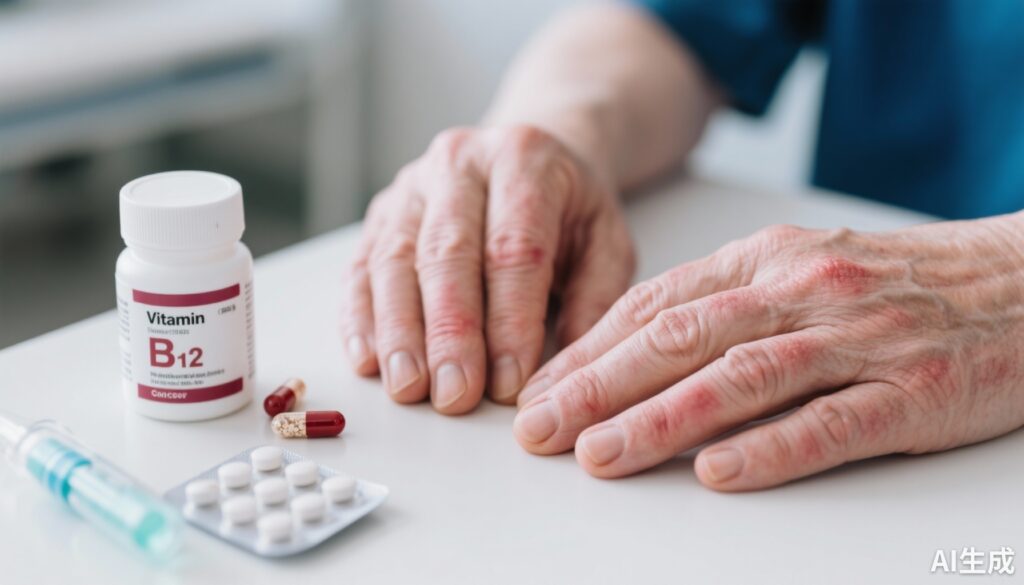Highlight
Oral methylcobalamin (vitamin B12) supplementation reduced the incidence of grade 2 or higher hand-foot syndrome by 50% in women undergoing capecitabine chemotherapy for early HER2-negative breast cancer. The vitamin was well tolerated and did not increase chemotherapy toxicity. This represents a promising, easily implementable supportive care strategy to improve patients’ quality of life and potentially avoid chemotherapy dose modifications.
Study Background and Disease Burden
Hand-foot syndrome (HFS), also called palmar-plantar erythrodysesthesia, is a frequent adverse effect of chemotherapy agents such as capecitabine, affecting up to 73% of patients treated with this oral fluoropyrimidine. Capecitabine is integral to the adjuvant treatment of early-stage breast and colorectal cancers. HFS manifests initially as erythema, tingling, and numbness of the palms and soles (grade 1), but can progress to painful swelling, blistering, and ulcers in severe cases (grade 2 or higher), severely impacting daily functioning and quality of life.
The unclear pathophysiology is thought to involve small fiber peripheral neuropathy affecting the skin. Current preventive and treatment options are limited; celecoxib, an oral anti-inflammatory with some efficacy, is infrequently used due to safety concerns. More recently, topical diclofenac gel demonstrated substantial reduction in HFS incidence, yet further supportive interventions remain desirable to offer patients safe, effective, and easy-to-administer options.
Study Design
This multicenter, double-blind, randomized, placebo-controlled phase 3 trial conducted at seven hospitals in China enrolled 234 women with early-stage, HER2-negative breast cancer scheduled for adjuvant capecitabine chemotherapy. Patients were randomized 1:1 to receive oral methylcobalamin 0.5 mg three times daily or matched placebo for up to 24 weeks, concurrent with their chemotherapy cycles.
The methylcobalamin dose was supraphysiologic, aligned with doses used for peripheral neuropathy treatment. Patients were monitored every 3 weeks for signs and severity of hand-foot syndrome until completion of the eighth chemotherapy cycle or study withdrawal. The primary endpoint was the incidence of grade 2 or higher hand-foot syndrome.
Key Findings
Between January 2022 and February 2024, 234 patients were enrolled from seven hospitals in China (table S3 in supplementary appendix 2). Patients were randomly assigned in a 1:1 ratio to the methylcobalamin group (n=117) and the placebo group (n=117). All patients in both groups received their assigned treatments, and so a total of 234 patients were included in the intention-to-treat and safety analyses (117 patients in each group;). Of these, 230 (98%) received ≥80% of the methylcobalamin or placebo dose needed (detailed compliance in table S4 in supplementary appendix 2) and were included in the per protocol population (115 patients in each group), while four patients (two in each group) received <80% of the methylcobalamin or placebo dose needed. The last follow-up date for survival outcomes was 22 December 2024.
Among 117 patients in each group who completed treatment, grade 2 or higher HFS occurred in 17 patients (14.5%) receiving vitamin B12 compared to 34 patients (29.1%) in the placebo arm, representing a statistically significant 14.5% absolute risk reduction (P = .003). Notably, grade 1 HFS was numerically more frequent in the vitamin B12 group (36.8% vs 28.2%), possibly suggesting a shift from more severe to milder forms.
| Variable | All patients (n=234) | Methylcobalamin group (n=117) | Placebo group (n=117) | Risk difference (95% CI) | P value |
|---|---|---|---|---|---|
| Primary endpoint | |||||
| Incidence of grade ≥2 hand-foot syndrome | 51 (21.8) | 17 (14.5) | 34 (29.1) | −14.5 (−24.9 to−4.1); −14.1 (−25.0 to−3.2)* |
0.003† |
| Secondary endpoints | |||||
| Hand-foot syndrome related reduction or discontinuation of capecitabine | |||||
| Total | 25 (10.7) | 9 (7.7) | 16 (13.7) | −6.0 (−13.9 to 1.9) | 0.14‡ |
| Reduction | 21 (17.9) | 8 (6.8) | 13 (11.1) | −4.3 (−11.6 to 3.0) | 0.25‡ |
| 25% | 13 (5.6) | 6 (5.1) | 7 (6.0) | −0.9 (−6.7 to 5.0) | — |
| 50% | 8 (3.4) | 2 (1.7) | 6 (5.1) | −3.4 (−8.1 to 1.2) | — |
| Discontinuation | 4 (1.7) | 1 (0.9) | 3 (2.6) | −1.7 (−5.0 to 1.6) | 0.31‡ |
| Hand-foot syndrome grade§ | |||||
| Any | 127 (54.3) | 60 (51.3) | 67 (57.3) | −6.0 (−18.7 to 6.8) | 0.36‡ |
| 1 | 76 (32.5) | 43 (36.8) | 33 (28.2) | 8.5 (−3.4 to 20.5) | 0.16‡ |
| 2 | 43 (18.4) | 14 (12.0) | 29 (24.8) | −12.8 (−22.6 to−3.0) | 0.01‡ |
| 3 | 8 (3.4) | 3 (2.6) | 5 (4.3) | −1.7 (−6.4 to 2.9) | 0.47‡ |
| Initiation of grade ≥2 hand-foot syndrome, median (range)¶ | |||||
| Week | 8 (2-23) | 8 (2-20) | 8 (2-23) | — | 0.93** |
| Cycle | 3 (1-8) | 3 (1-7) | 3 (1-8) | — | — |
Data are numbers (%) unless otherwise stated.
Safety analyses revealed comparable incidences of chemotherapy-related adverse events between groups—75.2% in the B12 group versus 81.2% in placebo—primarily hematologic toxicities like lymphopenia, leukopenia, and anemia. Importantly, methylcobalamin did not increase chemotherapy toxicity or cause treatment-specific side effects.
These findings indicate that vitamin B12 supplementation effectively halves the risk of clinically meaningful, moderate-to-severe hand-foot syndrome without compromising chemotherapy safety.
Expert Commentary
Eleonora Teplinsky, MD, head of Breast and Gynecologic Medical Oncology at Valley-Mount Sinai Comprehensive Cancer Care and a recognized ASCO breast cancer expert, praised the results as “quite impressive.” She emphasized that HFS can be debilitating, often necessitating chemotherapy dose reductions or interruptions, thereby potentially impacting oncologic outcomes.
Teplinsky highlighted the clinical significance of reducing grade 2 or higher HFS, which directly translates into improved quality of life and therapy adherence. She also noted that the absence of increased toxicity with vitamin B12 is an encouraging aspect for its practical adoption.
The use of methylcobalamin for peripheral neuropathies in Asian clinical practice provides biological plausibility, linking small fiber neuropathy mechanisms in HFS to B12’s neurotrophic effects. This mechanistic insight supports the rationale for further exploring B12 as a preventive agent.
Context in Current Supportive Care Landscape
Prior to this, celecoxib was the only agent with proven efficacy against HFS but was limited by safety concerns. The recent D-TORCH trial demonstrated a 75% reduction in HFS incidence using topical diclofenac gel, a widely used NSAID with a favorable safety profile, which has been rapidly adopted as a practice-changing intervention.
Vitamin B12 supplementation offers a convenient, oral option with an established safety record, particularly relevant for patients already burdened by complex chemotherapy regimens. Its neuroprotective properties and low side effect profile render it an attractive adjunctive prophylactic agent.
Limitations and Future Directions
While the results are compelling, the study population focused on early-stage, HER2-negative breast cancer patients receiving adjuvant capecitabine in China; generalizability to other cancer types, stages, and ethnic groups requires further validation.
The increased incidence of grade 1 HFS in the treatment group invites additional investigation to clarify its clinical relevance and to optimize dosing and duration strategies.
Combination strategies incorporating both topical and systemic agents like diclofenac and vitamin B12 merit future clinical trials to seek additive or synergistic benefits.
Long-term outcomes related to chemotherapy adherence, cancer control, and patient-reported quality of life beyond the primary endpoint would enrich understanding of vitamin B12’s supportive care role.
Conclusion
This rigorously conducted phase 3 trial provides robust evidence that high-dose oral methylcobalamin significantly reduces moderate-to-severe hand-foot syndrome in women undergoing capecitabine chemotherapy for early breast cancer, without added toxicity. Vitamin B12 supplementation represents a promising, safe, and easily implementable intervention to mitigate a common and debilitating chemotherapy side effect, potentially enhancing patients’ quality of life and treatment adherence.
Given its favorable safety profile and oral administration, vitamin B12 merits consideration as a supportive care adjunct in routine clinical practice pending further validation. Integration into clinical guidelines and exploration alongside existing topical anti-inflammatory agents could further refine HFS management.
Reference
Xia Y, Zhu Y, Ling L, Xu F, Yang Y, Ye J, Tan W, Chen Z, Liu Q, Wei W, Zhang J, Zhang A, Zhang L, Song E, Gong C. Effect of methylcobalamin on capecitabine induced hand-foot syndrome in patients with HER2 negative early breast cancer: multicentre, double blind, randomised, placebo controlled, phase 3 trial. BMJ. 2025 Sep 11;390:e084290. doi: 10.1136/bmj-2025-084290 IF: 42.7 Q1 . PMID: 40935571 IF: 42.7 Q1 ; PMCID: PMC12423938 IF: 42.7 Q1 .





I am not rattling fantastic with English but I line up this very easygoing to interpret.